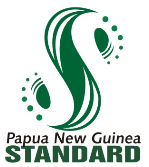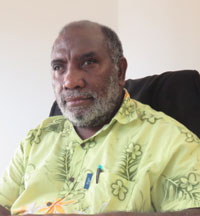
STANDARDS DEVELOPMENT DIVISION

Executive Manager
Standards Development Division
Mr. Dan Yansom leads the Standards Development Division. He has been performing this role since February 2007. He holds a Bachelor of Engineering in Civil Engineering from the Papua New Guinea University of Technology. Prior to joining NISIT, Mr. Yansom has worked in the petroleum sector, having spent nearly 10 years in different roles with Mobil Oil New Guinea Limited, SGS Oil & Gas Inspection Services, Pacifica Marine, and InterOil Products Limited. He has had work engagements with Mobil Oil Australia, Mobil Oil Micronesia, and Mobil Oil New Caledonia rolling out the ExxonMobil Product Quality Management System.
Standards development requires a lot of inputs from different stakeholders and interest groups. Therefore, it is paramount that credit is given to the many technical experts who offer their time and knowledge ‘free of charge’ to standards development work at NISIT. The 900 or so Papua New Guinea Standards (PNGS) adopted and/or produced to date cannot be achieved without the expertise provided by these group of people.
At this point in time, the national economy is heavily dependent on foreign aid and investments from countries such as Australia, New Zealand, USA, and some countries in Asia. As such, the standards of these countries seem to dominate how goods and services are made available to Papua New Guineans. In this manner, local conditions are not taken into account thus, the quality of these goods and services can be compromised in some ways. Adding to this challenge is the globalization game being played around the world. Developing countries such as PNG with its little capacity in technical knowledge and technology have great difficulty in adapting to the evolving trends of international trade.
Papua New Guinea is a signatory to international trade treaties and regional trading blocs such as the World Trade Organization (WTO), United Nation Sustainable Development Goals (UN-SDG’s), and Asia Pacific Economic Cooperation (APEC). With its limited technical knowledge and technology; PNG struggles to contribute meaningfully to achieving the set objectives of these treaties. Developing our own National Standards and aligning them to International Standards can be an effective tool to rectify this issue.
Thanks to management for restructuring the NISIT organization, and the Commonwealth Standards Network under the United Kingdom Department of Foreign International Trade, real efforts are now being made to build capacity within the Standards Development Division to try and rectify the challenges identified. With this assistance, the standards development function of NISIT should become effective and efficient in capturing the standardization needs of Papua New Guinea as they relate to the economic, social, physical, and environmental welfare of the country and its people.
ABOUT THE DIVISION
The Division is established to implement the functions of NISIT as specified in Sections 5(a), 5(d), 5(g), and 5(ai) of the NISIT Act of 1993. To do this, several technical committees have been planned and earmarked to cover standards development work on various fields including Biology, Building, Construction, Electrical Appliances, Electronics & Renewable Energy, Food, Industrial Chemistry, Mechanical, Organic Chemistry, and Services. At the present time, standards development and verification work are active for the Building, Construction, Food, Electrical Appliance, and Mechanical fields. The committees are supported by a Standards Development Officer who provides all the secretariat functions.
The Standards Development Division is led by an Executive Manager and three ‘active’ Standards Development Officers. The Division the Standards Information Officer with the Corporate Services Division. Whilst the Executive Manager has over 13 years working experience in NISIT, the standards officers have varying levels of experience within the organisation ranging from 1 to 8 years. Qualifications of staff members are first degrees in applied chemistry, building technology, civil engineering, and mechanical engineering.
To date, there are approximately 900 PNG Standards of which 5% are home grown. The remainder are adoptions of Australian (AS), New Zealand (NZS), Joint Australian & New Zealand Standards (AS/NZS), International (Codex, IEC & ISO) and ASTM Standards.
STANDARDS DEVELOPMENT PROCESS
In the process for standards adoption, it should not take more than 6 months to complete. It follows the committee review, public comment, ballot and then publication. For any standards which will be developed from the initial stage, the process takes up to 1.5 years to complete. For both line of work, the technical aspects are usually fast to complete however, the administrative and legal issues, if any, at the gazettal and publication stage will delay the project completion.
The NISIT Standardization Directives Part 1 and Part 2 provides the mechanism on how Papua New Guinea Standards shall be adopted and/or developed. These documents are adopted from the ISO/IEC Standardization Directives and customised to the economic and social operating conditions of Papua New Guinea.
When a Standard is published, it is gazetted by the PNG Government after approval by the Minister for Commerce & Industry. All Papua New Guinea Standards (PNGS) are ‘voluntary’ documents unless they called up in legislation. When a Standard is adopted as a PNGS, it is allocated a unique number. For example, PNGS/AS 3000 for electrical wiring rules. This Standard is ‘mandatory’ as it is called up in the Papua New Guinea Electricity Regulation.
NATIONAL / REGIONAL / INTERNATIONAL LINKAGES
NISIT is a ‘corresponding’ member of the International Organisation for Standardization (ISO), and a member of the International Electro-technical Commission (IEC) Affiliate Country Programme. NISIT is also a member of Pacific Area Standards Congress (PASC) and it represents Papua New Guinea at the Asia-Pacific Economic Co-operation (APEC) Sub-Committee on Standards and Conformance (SCSC). In addition, NISIT also participates in the Part 1 (regulatory and standards requirements) of APEC Electrical & Electronic Mutual Recognition Arrangement (EE MRA).
At a national level NISIT has connections with:
- Department of Commerce and Industry
- Department of Foreign Affairs & International Trade (TBT matters)
- National Agricultural Quarantine and Inspection Authority (SPS matters & contact point)
- Department of Agriculture and Livestock (Codex contact point), and
- Food Sanitation Council (under Ministry of Health).
RELEVANCE OF STANDARDS TO INTERNATIONAL TRADE
- Global trade is increasing faster than production.
- The real costs associated with non-tariff barriers to trade are more subtle than tariffs as a cost.
- International trade policy is moving from tariffs and quotas to technical barriers and standards underpinning them.
- International institutions such as the World Trade Organization are giving status to international standards to foster trade.
- National standards are increasingly based on international standards, and the subject-matter widening.
- Confidence between trading countries on each other’s regulatory outcomes and conformity assessment systems
- Implement principles of mutual recognition, unilateral recognition or harmonization that provide the most appropriate or cost-efficient approach to the removal or reduction of technical, sanitary and phytosanitary barriers to the movement of goods between countries.
WHAT IS A STANDARD?
A document approved by a recognized body, that provides, for common and repeated use, rules, guidelines or characteristics for products or related processes and production methods, with which compliance is not mandatory. It may also include or deal exclusively with terminology, symbols, packaging, marking or labeling requirements as they apply to a product, process or production method.
According to the World Trade Organization (WTO), Standards are technical barriers to trade (TBT). The other two being regulations and conformity assessment procedures. Therefore, according to the WTO-TBT definitions, a Standard becomes a Technical Regulation when compliance is made ‘mandatory’. However, there are other technical regulations that are not standards, for example, the European Union (EU) Directives or performance requirements in building codes. Even the ‘voluntary’ standards have an effect on trade, especially when used in contracts, so the WTO rules make good sense.
